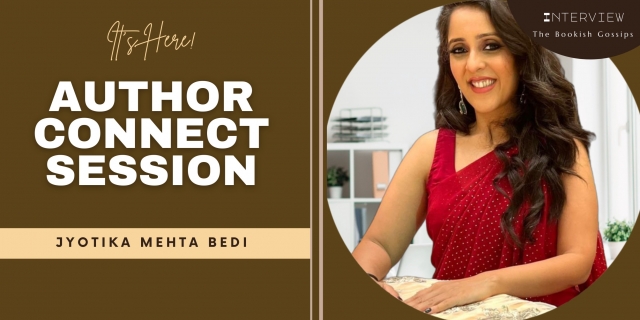For some writers, stories begin with dreams. For others, they begin with pain. In the case of Jyotika Mehta Bedi, her journey into authorship began during some of the most emotionally overwhelming chapters of her life. Her debut book, Trapped in Overthinking: Break Free with Self Love, is not a collection of theoretical insights. It is a raw, heartfelt reflection of lived experience. A mirror that speaks directly to anyone who has ever felt lost in their own thoughts and longed for peace.
In this conversation with Unnati Shahi of The Bookish Gossips, Jyotika opens up about her deeply intuitive writing process, her emotional evolution, and the courage it took to turn her inner voice into something the world could read. What emerges is a portrait of a writer who does not seek perfection but healing. Not praise but presence. Her words are not crafted for attention. They are written for connection.
Writing from Wounds, Not Just Words
When asked what first sparked her love for writing, Jyotika does not point to childhood journals or creative writing contests. She speaks instead of pain. Of feeling mentally trapped, emotionally saturated, and overwhelmed by the noise in her own head. “My love for writing was born out of pain,” she says with honesty. “I used to feel trapped in my own thoughts, and putting them down on paper gave me relief.”
This is where her journey truly began. Not with a dream to become an author, but with a deep need to find space. To exhale. To make sense of inner chaos. For Jyotika, the turning point came when she realized that her pain could be someone else's comfort. That the words which once rescued her might offer the same release to someone else.
“I never set out to be an author. The moment I realised my words could help someone else feel less alone, that's when I embraced the author in me.”
Also Read: In Conversation With Rishi Suri, Author Of Book, Children Of The Chinar
A Voice That Transformed Over Time
Like many writers who start out uncertain, Jyotika admits that her early writing was covered in protective layers. She describes using complex language and perfectly polished sentences as a form of self-shielding.
“Earlier, I used to hide behind complex words and perfect sentences,” she confesses. “Now I write from my heart.”
The shift was not just stylistic. It was spiritual. As she grew more comfortable in her vulnerability, her voice softened. It became more intimate, more accessible, and ultimately, more impactful.
“My voice has become more real, more raw, and deeply personal. Because I want people to feel me, not just read me.”
This intention has shaped the very soul of her book. Her words do not instruct. They invite. They do not preach. They sit quietly beside the reader, whispering, I have been there too.
The Core of Her Storytelling
Every author has themes they return to again and again. For Jyotika, those themes are clear and consistent. Overthinking. Self-love. Freedom. She returns to these not out of habit, but because they are still active parts of her journey. Each one carries personal meaning and universal relevance.
“I always come back to the idea that healing begins with how gently we learn to hold ourselves, and how courageously we learn to let go.”
This line, simple as it is, carries the heart of Trapped in Overthinking. It is a book about learning to soften, not in weakness, but in strength. About choosing compassion over control. Presence over perfection.
Why Trapped in Overthinking Had to Be Written
Of all the questions an author gets asked, the one that matters most is why. Why this book. Why now. Why these stories. For Jyotika, the answer is personal. Deeply personal. This book is not based on research or theory. It is carved from her own life.
“Trapped in Overthinking is closest to my heart because it is my own journey. It is not theory. It is lived experience.”
She describes the book not as a product but as a process. A reflection of her own growth and healing, shared so that others might see their own reflection more clearly.
“What makes it special is that it's not just a book. It's a mirror for anyone who has felt stuck in their own mind and longed for peace.”
It is this emotional honesty that gives the book its power. It does not tell readers what to do. It shows them that they are not alone.
A Process Led by Heart, Not Structure
Some writers thrive on structure. Jyotika does not. Her process is not built around outlines or word count goals. It is built around emotional honesty and intuition.
“I don't sit with an outline. I sit with my heart,” she says.
This way of writing is unpredictable. Sometimes the words flow like water. Other times they arrive as a single drop. But Jyotika has learned to trust the rhythm of her own emotional landscape.
“Sometimes it flows like a river. Sometimes only a drop appears. But I trust that whatever comes is what needs to be written.”
This kind of intuitive writing requires courage. It requires surrender. And above all, it requires the willingness to show up even when inspiration feels far away.
Real Life in Every Line
One of the most defining aspects of Jyotika's work is its authenticity. Nothing is imagined. Nothing is performed. Every chapter, every insight, every lesson has been shaped by real experiences and real people.
“Everything I write is real. My own battles. The people I meet. The stories I witness. All of it weaves into my words.”
She believes that the most powerful writing is not necessarily the most poetic or polished. It is the writing that is honest. That dares to name the things most people are afraid to speak out loud.
“I believe the most powerful writing is born when we stop pretending and start sharing our truths.”
Her truth has become a bridge for others. A space where pain can be named. Where healing can begin.
What Writing Revealed
Writing often teaches authors about language. For Jyotika, it taught her about herself. It revealed parts of her she had forgotten. Strength she did not know she had. Softness she had once feared.
“Yes, writing taught me that I am stronger than I thought. And softer too.”
For her, writing has been both mirror and medicine. A way to understand her own growth. A way to create space for others to grow too.
“It taught me that vulnerability is not weakness. It is power.”
That belief pulses through every page of her book.
Behind the Life of an Author
In the age of social media, authors are often seen through the lens of likes, book signings, and perfectly curated writing desks. But Jyotika paints a different picture. She offers a reality that is quieter, lonelier, but far more sacred.
“It's not about fame or followers. It's about baring your soul and reliving your wounds so that someone else can heal theirs.”
Being an author is not always glamorous. But it is meaningful. And for Jyotika, it is nothing short of sacred.
“It's lonely at times, but it's also sacred. Because words can change lives.”
Final Thoughts
Trapped in Overthinking is not just a book. It is a shared space for healing. A place where overthinkers can pause, where self-love can be learned gently, and where freedom is not just a destination but a choice made each day.
In this powerful conversation with Unnati Shahi, Jyotika Mehta Bedi reminds us that writing is not just about what we say. It is about what we are willing to feel. What we are brave enough to share. And what we are strong enough to release.
Through her journey, she offers more than insights. She offers presence. Through her words, she offers more than answers. She offers understanding.
Interview by Unnati Shahi | Founder, The Bookish Gossips
And through her story, she reminds every reader that healing is not loud. It is not fast. But it is always possible.






